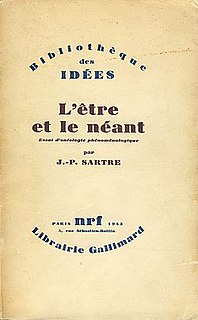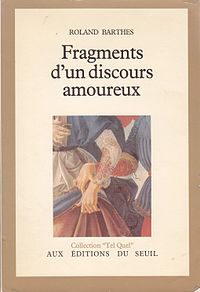 W
WThe Art of Loving is a 1956 book by psychoanalyst and social philosopher Erich Fromm, which was published as part of the World Perspectives series edited by Ruth Nanda Anshen. In this work, Fromm develops his perspective on human nature from his earlier works, Escape from Freedom and Man for Himself – principles which he revisits in many of his other major works.
 W
WBeing and Nothingness: An Essay on Phenomenological Ontology, sometimes published with the subtitle A Phenomenological Essay on Ontology, is a 1943 book by the philosopher Jean-Paul Sartre. In the book, Sartre develops a philosophical account in support of his existentialism, dealing with topics such as consciousness, perception, social philosophy, self-deception, the existence of "nothingness", psychoanalysis, and the question of free will.
 W
WLove and Its Place in Nature: A Philosophical Interpretation of Freudian Psychoanalysis is a book about psychoanalysis by the philosopher Jonathan Lear, in which the author discusses the importance of love in Freudian theory.
 W
WA Lover's Discourse: Fragments is a 1977 book by Roland Barthes. It contains a list of "fragments", some of which come from literature and some from his own philosophical thought, of a lover's point of view. Barthes calls them "figures"—gestures of the lover at work.
 W
WPhilosophy of Love: A Partial Summing-Up is a 2009, book by the American philosopher Irving Singer, in which the author summarizes and expands upon the themes of his earlier three-volume works The Nature of Love (1984–1987) and Meaning in Life (1992–1996). The book, which has been described as an "intellectual biography" by its author, received positive reviews.
 W
WSexual Desire: A Philosophical Investigation, published as Sexual Desire: A Moral Philosophy of the Erotic in the United States, is a 1986 book about the philosophy of sex by the philosopher Roger Scruton, in which the author discusses sexual desire and erotic love, arguing against the idea that the former expresses the animal part of human nature while the latter is an expression of its rational side. The book was first published in the United Kingdom by Weidenfeld and Nicolson, and in the United States by Free Press.
 W
WThe Symposium is a philosophical text by Plato dated c. 385–370 BC. It depicts a friendly contest of extemporaneous speeches given by a group of notable men attending a banquet. The men include the philosopher Socrates, the general and political figure Alcibiades, and the comic playwright Aristophanes. The speeches are to be given in praise of Eros, the god of love and desire. In the Symposium, Eros is recognized both as erotic love and as a phenomenon capable of inspiring courage, valor, great deeds and works, and vanquishing man's natural fear of death. It is seen as transcending its earthly origins and attaining spiritual heights. This extraordinary elevation of the concept of love raises a question of whether some of the most extreme extents of meaning might be intended as humor or farce. Eros is almost always translated as "love", and the English word has its own varieties and ambiguities that provide additional challenges to the effort to understand the Eros of ancient Athens.